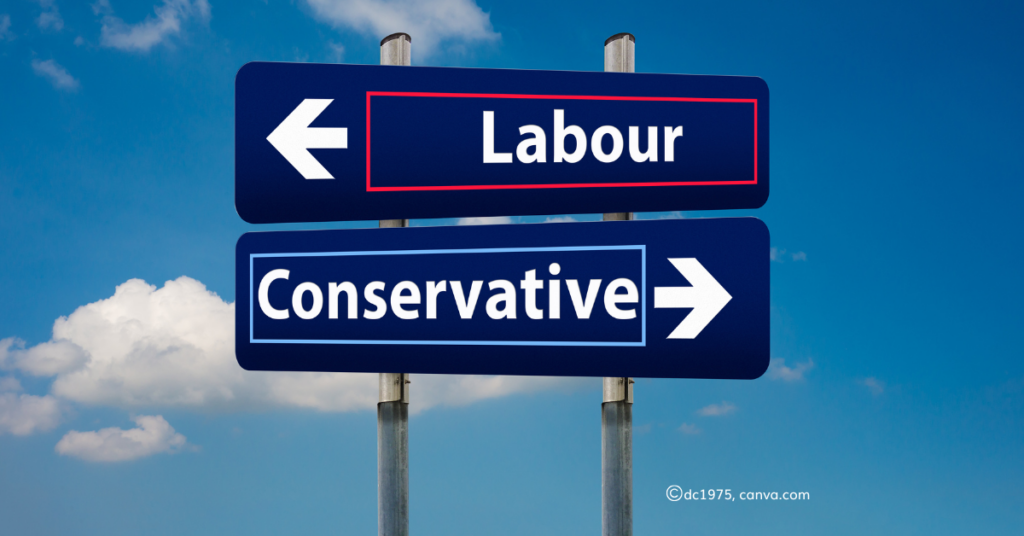Rishi Sunak’s working assumption is that the next general election will take place in the second half of 2024. The persistent claim across the industry is that election year brings with it uncertainty for the housing market, but home experts, Hamptons disagree. On the contrary, their research shows that there is typically a 2% increase in the number of homes being bought and sold in the lead-up to elections – a sign, they argue, of people’s optimism and hope for change during a political shake-up.
Whatever hopes and dreams the Conservative Party had for the UK’s housing market back in 2019, it’s probably fair to say that it didn’t go to plan. The aftershocks of Liz Truss’s mini-budget are still being measured across the industry. Interest rates, although showing some stability, are still higher than they have been in decades, and it’s assumed many would-be borrowers are holding fast, waiting for a more predictable landscape in which to invest.
With Labour leading in the polls since December 2021, it’s time to consider what Kier Starmer’s government will do for the housing market in 2024.
What promises have been made?
Housing Supply
In the run-up to the last election, the Conservatives pledged 300,000 new affordable homes per month by the mid-2020s. By the end of 2022, Michael Gove was re-marketing these targets as ‘advisory’. Labour has said that the withdrawal of pressure from this benchmark would lead to the lowest rates of new builds completed since the Second World War, with Starmer promising to reinstate the targets and ‘Get Britain Building Again’ with a 2024 election win.
First-time Buyers
In contrast to Rishi Sunak’s tentative suggestion that he might reinstate the Help to Buy scheme to aid first-time buyers, Starmer went one step further and announced controversial plans in 2022 to give first-time buyers first refusal on all new-builds. In theory, it’s a plan that shows good intentions but throws up myriad problems in practice – the largest of which is likely to be: who will want to build new houses knowing the return is guaranteed to be lower? Critics of the proposal applaud the sentiment but reiterate that it doesn’t tackle the root problem – Britain’s housing shortage and anti-development authorities.
Affordable Housing
Pledging the biggest boost in affordable housing in a generation, Labour Deputy Leader and Shadow Housing Secretary Angela Rayner has promised her Party will increase the number of affordable homes built each year. The plans include serious crackdowns on developers who try to evade their affordable housing obligations, alongside new support for local authorities. Rayner announced that a new expert unit was to be set up, with the primary function of helping councils and housing associations navigate deal negotiations with housing developers.
Short-term Lets and Holiday Homes
Responding to the local communities in Britain’s tourist hotspots who claim they are priced out of their own neighbourhoods, Labour first hinted at a UK-wide licensing system in July 2022. The plans include a Right-to-Buy scheme, which would see communities offered first refusal on properties with community value (football clubs, music venues, etc.) that have been put up for sale or have fallen into a state of disrepair. The plans aim to simultaneously help people buy within their own communities and prevent rural areas from becoming ghost towns during low tourist seasons.
Renting
There at least seems to be agreement across the parties that renting rules need close attention. The Conservatives have introduced the Renters Reform Bill, which is currently making its way through parliament processes. Labour has its own answer to the problem in the form of a ‘Renters’ Charter’. The proposed legislation would see an end to no-fault evictions, allow tenants to make reasonable alterations to a property, and introduce a four-month notice period for eviction. It would also allow tenants the right to have pets and disallow automatic evictions for rent arrears.
Tax
We’re promised property-related tax changes under a new Labour government with the aim of making the tax system more equal. These include reforms to council tax and the possibility of implementing a land value tax. They have also announced an increase in the stamp duty surcharge for overseas buyers in an attempt to reduce demand and fund building more affordable houses. In August last year, Shadow Chancellor Rachel Reeves announced that Labour would not be introducing a mansion tax on expensive properties. She also confirmed that there will not be an increase in capital gains tax or the top rate of income tax.
Regulation
Labour have doubled down on their commitment to increased regulation in the wake of the Grenfell Tower tragedy. They have pledged to make sure that every property is ‘up to scratch’. The plans include a new set of minimum standards to be enforced through nationwide licensing. They also promise tougher consequences for landlords who continue to operate outside of the rules.
How will all of this affect the property market?
Labour’s policies focus on social equality, fairness, and increased accountability for landlords, with some big promises on new development. They have correctly focused on the supply of new homes as the crux of the housing crisis, but we’re still unclear on how those plans will be delivered. As yet, we have no sense of which regions Labour will prioritise for investment or how they will regulate the private sector to build more houses. Some transparency on the thinking behind the pledges would provide much-needed reassurance to the housing industry.
Chief among the concerns is the worry that increased regulation and sanctions make new developments and renovations less of an attractive investment. In conjunction with increased rental regulations, landlords may be more cautious about taking on new properties under a Labour government.
A similar concern arises with the introduction of a land value tax, which again affects the appeal of investment for both second homes and luxury properties. This may eventually lead to a decrease in house prices as demand falls – particularly in prime locations. Investors, including those outside the UK, may opt to find more favourable conditions, likely also impacting peripheral industries and local economies.
“Based on Labour’s proposed policies, key impacts could include a cooling of the overheated prime property market, a shift in investment trends, and a more equitable distribution of housing resources. For homeowners in prime areas, this may mean a stabilisation or slight decrease in property values and potentially higher property-related taxes. Real estate investors and developers could face decreased profitability and may need to adjust their investment strategies. However, the policies could be greatly beneficial for first-time homebuyers and lower-income groups, providing them with more opportunities to access affordable housing and improving their living conditions.”
F&B Prime Property Management, London
There will inevitably be some uncertainty and unforeseen impacts of a political change of hands, but if history teaches us anything, it’s not to fear for the housing market under a Labour government. A recent report by Middleton Advisors reveals that Labour Prime Minister Tony Blair was at the helm during the greatest period of growth for the housing market, beating Margaret Thatcher, who follows in second place. Of course, this report only considers the numbers – not the context upon which the growth is based. Thatcher’s flagship right-to-buy policy arguably started a 40-year housing crisis, while Blair’s target of 200,000 new homes a year consistently went unmet until 2005 – 8 years into his premiership.
The authors of the report suggest these periods of growth have little to do with political party, and everything to do with leadership, asserting that “while there is little to link market movements to one party or the other, it does appear that the market responds well to decisive leadership – the Thatcher and Blair effect, and the way that may inspire greater economic confidence amongst the wider population.”
So, while we’ve determined that there may be ripple effects resulting from a policy shake-up under a new Labour government, the bigger question mark over Mr Starmer’s leadership skills as our new Prime Minister remains to be answered. For that, we’ll have to wait and see.


